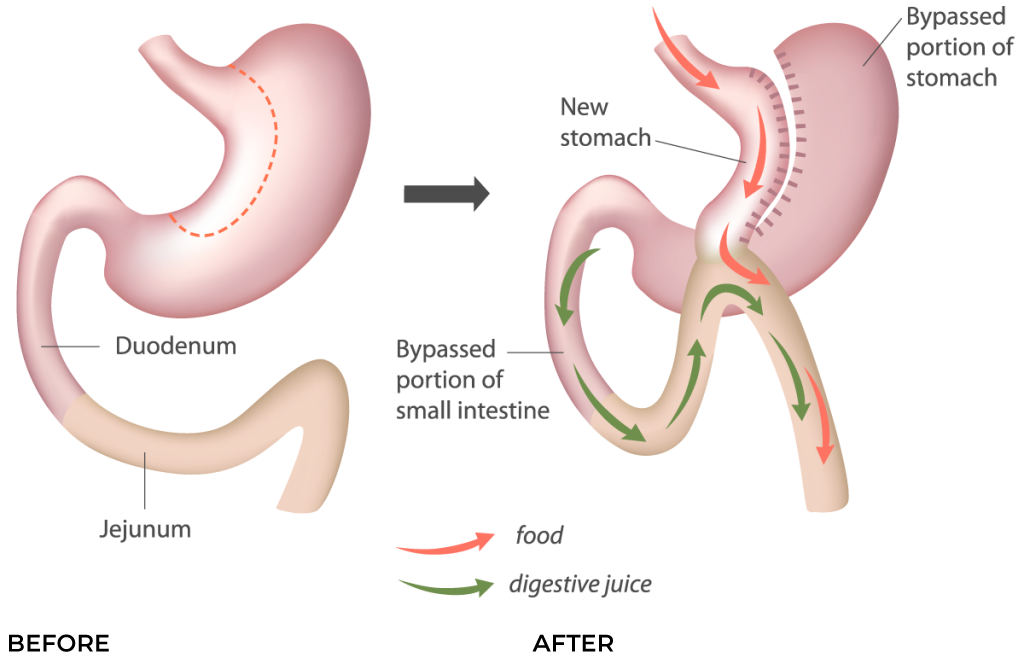Mini Gastric Bypass Surgery
WHAT IS MINI GASTRIC BYPASS SURGERY?
The operation is done as ‘keyhole’ surgery while you are under a general anaesthetic.
Having this procedure will be a tool to help you change how and what you eat. You will not be able to eat as much as before because after this type of surgery patients generally feel fuller much sooner and less hungry.
This method of surgery is recommended for patients with a BMI (Body Mass Index) of 35 and over. On average, patients tend to lose 30% of their total body weight in the first year after their surgery.
This is an operation where some of the stomach and part of the small intestines are bypassed. The stomach is stapled to leave a smaller pouch and then a section of the small intestine is attached to the stomach pouch that has been created.
MINI-GASTRIC BYPASS

IS MINI GASTRIC BYPASS SURGERY RIGHT FOR ME?
Professor Purkayastha explains the benefits of Mini Gastric Bypass surgery, and for which people this might be the better choice of surgery.
SOME IMPORTANT INFORMATION ABOUT MINI GASTRIC BYPASS SURGERY
Here are some questions about Mini Gastric Bypass surgery we are frequently asked by patients. We believe it is important you have all the information you require, so you can make an informed decision if surgery is the right option for you.
People who choose Mini Gastric Bypass Surgery can enjoy sustainable and long-term weight loss. Reducing the size of the stomach pouch results in you feeling full more quickly and reduces the intake and absorption of calories.
Although each individual is different, on average someone who has Mini Gastric Bypass surgery can lose up to 35% of excess body weight in the first year after surgery.
The positive health outcomes from Mini Gastric Bypass surgery include weight loss and the reduction of conditions related to increased weight. This includes but not limited to:
- Type 2 Diabetes
- High Cholesterol
- High Blood Pressure
- Heart Disease
- Stroke
- Mobility issue
- Joint pains
- Cancer
- Sleep Apnoea
- Infertility
Weight loss and better health can also improve the quality of your life and mental health, boosting self confidence and opening up new doors for how you want to live your life
Professor Puraksyastha will walk you through the preparation steps in the weeks leading up to your Mini Gastric Bypass surgery. The support you are given is tailored to you, following full metabolic, dietetic and psychological assessments. This is to ensure the best preparation and outcomes possible.
Our specialist dietitian will help you to prepare for your Mini Gastric Bypass surgery by undergoing a pre-operative liver-reduction diet lasting two weeks. The diet is low in fat and moderate in protein and low in calories, providing approximately 800-1000 kcal per day. The aim of the pre-operative diet is to shrink your liver meaning it can be moved more easily, making the operation safer. In the 24 hours before your surgery, you will be required to restrict your food and drink intake.
Our specialist psychotherapists will also help you to be best prepared for your surgery, ensuring you have the psychological support to ensure best outcomes.
Dietary changes
There are three stages of texture modification diet following surgery, starting with a liquid diet and gradually building this back up to a long term, solid textured food.
Your specialist dietitian will help explain and guide your through the post-operative diet which follows the below stages:
- liquid diet (10 days)
- puree diet (3-4 weeks)
- soft diet (for around 6 weeks)
This is followed by a lifelong healthy, high protein diet of a normal solid texture from 12 weeks onwards.
Fluid intake remains important and you should aim to drink 1.5 litres a day. Avoid high calorie fluids including hot drinks made with sugar and fizzy drinks as these can cause bloating and discomfort.
Alcohol should not be taken for three months after surgery and after this time in moderation after food.
Lifestyle changes
Exercise – After surgery we advise you to move around as much as possible and ensure that you don’t get dehydrated. Exercise should be gentle for the two months – i.e. swimming, walking, cycling. No heavy lifting or weight training for at least eight weeks
In the long-term increased activity levels are needed alongside a reduced dietary intake for optimal and sustained weight loss after bariatric surgery.
Driving – You should not drive for the first two weeks following surgery and contact your insurance to find out what their guidelines are.
We suggest that when you are ready to drive that you ask a family member or a friend to drive you to a quiet street where you can attempt an emergency stop. If it feels comfortable then it is fine for you to drive.
Travel – We advise that you do not take a long haul flights for 8 weeks following your surgery
You can take flights of no more than 2 hours duration from two weeks after your surgery
Pregnancy – We advise you to avoid pregnancy for 2 years after surgery. Oral contraception can be restarted 1 month after surgery
Smoking – It is strongly advised to quit smoking in the long-term as this can undo the positive health outcomes from surgery, and increases risk of ulceration in the gastric pouch, chest infections, cancers and heart disease.
After your recovery period has ended, you can start to enjoy the lifestyle changes that come about from better health and increased mobility associated with Mini Gastric Bypass surgery.
Your aftercare package includes prolonged support from Mr. Purkayastha and your specialist dietitian, as well as the wider Surgical WeightMatters team.
You will have in-person follow-up appointments with Mr. Purkayastha arranged 7-10 days, 3 months, 6 months and 12 months after surgery with the option of additional follow-up appointments to check in with your progress.
You will have several post-operative appointments with your specialist dietitian as well, which are spread over 2 years after your surgery and tailored to suit your needs.
There is no limit to how many sessions you can have with the Surgical WeightMatters team. We are with you every step of the way to ensure the best support and outcomes possible.
My Purkayastrha will take time to talk you through the risks involved and ensure you are fully informed before consenting to Mini Gastric Bypass surgery.
Every effort ensures these risks are avoided, and Mr Purkayastha is an extremely experienced bariatric surgeon. However, there are short and long-term risks to the Mini Gastric Bypass surgery which include:
Short-term risks:
- Pain
- vomiting
- Bleeding
- Infection of the wound
- Adverse reactions to anaesthesia
- Blood clots
- Breathing problems
- Leaks from the cut edge of the stomach
- Potential complications from nutritional deficiencies
- Dumping syndrome
Long-term risks:
- Gastrointestinal obstruction
- Hernias
- Gastroesophageal reflux and heartburn
- Low blood sugar (hypoglycemia)
- Malnutrition, food intolerances or Dumping Syndrome
- Vomiting
- Blood clotting
- Stomach ulcers
- Barrett’s oesophagus
Weight regain, if diet and lifestyle changes are adhered to lifelong habits
Loose stool and sometimes diarrhoea
Complications during surgery can result in elective or emergency medical or surgical (reoperation) treatment.
Next steps
If you are interested in Mini Gastric Bypass surgery and still have some questions, please book a complimentary call with our friendly Patient Concierge team.
They will listen to your story, answer your questions, and ask about your health goals. If you are ready, they will get you booked in to meet your surgeon for a pre-surgery metabolic assessment and consultation.
- Review of your weight history
- Assessment of your current health picture
- Explore your motivation and goals
- Understanding your readiness and support structure
- Bespoke treatment pathway designed for you
- Build trust with your surgeon and care team
LEARN WHAT IS INVOLVED IN MINI GASTRIC BYPASS SURGERY
This animation explains the changes made to your digestive system during Mini Gastric Bypass surgery.
LET US EXPLAIN HOW WE CAN HELP YOU
Speak with our friendly patient concierge team, and let us answer any questions you have about weight loss surgery.
PRE-SURGERY METABOLIC ASSESSMENT & CONSULTATION
Your weight loss surgery journey starts when you meet your Bariatric Surgeon for a pre-surgery metabolic assessment and consultation.
It is important you can ask all the questions you have about surgery, and make a connection with the person who will perform your surgery.

Weight & Health History
Current Health Status
Goals & Aspirations
Pros & Confs of Different Surgeries
Bespoke Surgical Pathway Created For You
PRE-SURGERY ASSESSMENT & PREPARATION WITH YOUR CARE TEAM
Your surgeon will work closely with your Multidisciplinary Team (MDT), a Bariatric Dietitian and Bariatric Psychotherapist . Together they will ensure you are fully prepared for your surgery.
All pre-surgery blood work is included in your bariatric package. In some instances we may require additional diagnostic tests, or refer you to a consultant in our wider MDT; Endocrinologist, Sleep Specialist, Bariatric Psychiatrist.
Your safety and care is at the heart of what we do. Exceptional outcomes come from good preparation and planning, and an integrated team that shapes your treatment to your individual needs.
Bariatric Dietitian Assessment & Pre-Surgery Diet Plan
Bariatric Psychotherapist Assessment & Motivation
Pre-Surgery Bloods & Other Diagnostics
Anaesthetist Care Call
Pre-Surgery Consultation With Your Surgeon

HOSPITAL EXPERIENCE
Your weight loss surgery includes a 2-night stay, in a private room, at the prestigious King Edward VII hospital, located in central London’s world-class medical district.
On arrival you will be met by your Specialist Nurse Practitioner, who will guide you through each step of your hospital stay.
Your surgeon will meet you before your surgery, and will check in with you, and your progress, the day after your surgery.

Specialist Nurse Practitioner Orientation
2-Night Private Room Stay
Weight Loss Surgery Procedure
Hospital Aftercare & Surgeon Assessment
Discharge Care Plan & Medication
2-YEAR AFTERCARE PACKAGE
Exceptional outcomes from weight loss surgery come from good planning and preparation, medical excellence at every touch point, and aftercare support that guides positive behaviour change.
Your bariatric team works with you closely over the next 2-years, as you adjust and transition to the opportunities and life changes post-surgery.
Sessions with your Bariatric Surgeon, Dietitian and Psychotherapist will be complemented by monthly group sessions and motivational email support, all curated with ongoing guidance from your Patient Concierge team.
Surgeon Follow-Up Consultations
Diagnostics Bloods Included
Ongoing Dietitian & Psychotherapist Support
Monthly Support Groups & Email Motivation
Patient Concierge Care & Guidance

HOW MUCH DOES Mini GASTRIC BYPASS SURGERY COST?
Please get in touch if you would like a quote for Mini Gastric Bypass.
You can find prices for our most popular procedures on the Gastric Sleeve, Gastric Bypass and Gastric Band pages.


